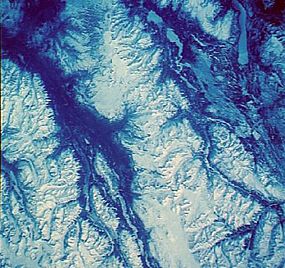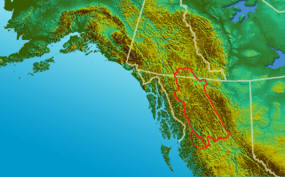Interior Mountains facts for kids
Quick facts for kids Interior Mountains |
|
|---|---|
| Northern Interior Mountains | |

Satellite photo of the Spectrum Range
|
|
| Highest point | |
| Dimensions | |
| Area | 221,310 km2 (85,450 sq mi) |
| Geography | |
| Location | British Columbia and Yukon |
| Parent range | Interior System |
The Interior Mountains are a huge group of mountain ranges. They cover a big part of northern British Columbia and southern Yukon in Canada. You might also hear them called the Northern Interior Mountains.
These mountains are mostly wild and untouched. Most of their thousands of peaks don't even have names! They are not very populated or developed.
There are four main groups of mountains here:
- The Skeena, Cassiar, and Omineca Mountains are north of the Interior Plateau. They sit between the Coast Mountains to the west and the Rocky Mountains to the east.
- The Hazelton Mountains are along the northwest side of the Interior Plateau. They stretch from the Bulkley Ranges south to the Bella Coola River.
The Stikine Plateau is also part of the Interior Mountains system. It has many smaller plateaus and mountain ranges. This plateau is west of the Cassiars, north of the Skeenas, and east of the Boundary Ranges (which are part of the Coast Mountains).
Contents
How the Mountains Got Their Name
Naming the Interior Mountains
The names Interior Mountains and Northern Interior Mountains were first used by a British Columbia government geographer named Stuart Holland. He wrote a very important book in 1964 called Landforms of British Columbia. This book describes the shapes of the land and the names of places in the province.
Holland used the term "Interior Mountains" throughout his book. He even used it as a chapter title for this mountain system. This name is now used as a basis for official names, like those in the provincial records.
Why "Interior Mountains"?
Stuart Holland also suggested "Northern Interior Mountains." He thought this name might help tell these mountains apart from other ranges further south in British Columbia's Interior. However, he decided to use "Interior Mountains" because it was shorter and easier to say.
Mountain Ranges and Plateaus
Many major mountain ranges and plateaus are considered part of the Interior Mountains. Here are some of them:
Cassiar Mountains
- Dease Plateau
- Kechika Ranges
- Sifton Ranges
- Stikine Ranges
Hazelton Mountains
- Bulkley Ranges
- Kispiox Range
- Nass Ranges
- Pattullo Range
- Tahtsa Ranges
Omineca Mountains
- Finlay Ranges
- Hogem Ranges
- Metsantan Range
- Samuel Black Range
- Swannell Ranges
- Tatlatui Range
Skeena Mountains
- Atna Range
- Babine Range
- Bait Range
- Driftwood Range
- Klappan Range
- Oweegee Range
- Sicintine Range
- Slamgeesh Range
- Strata Range
- Takla Range
Stikine Plateau
- Kawdy Plateau
- Nahlin Plateau
- Spatsizi Plateau
- Tagish Highland (Sometimes seen as part of the Coast Mountains)
- Tahltan Highland (Sometimes seen as part of the Coast Mountains)
- Taku Plateau (Sometimes seen as part of the Yukon Plateau)
- Tanzilla Plateau
Parks and Protected Areas
Many beautiful parks and protected areas are found within the Interior Mountains. These places help protect the natural environment and wildlife.
- Boya Lake Provincial Park
- Dall River Old Growth Provincial Park
- Denetiah Provincial Park
- Dune Za Keyih Provincial Park and Protected Area
- Horneline Creek Provincial Park
- Hyland River Provincial Park
- Kinaskan Lake Provincial Park
- Mount Edziza Provincial Park and Recreation Area
- Rainbow Alley Provincial Park
- Spatsizi Plateau Wilderness Provincial Park
- Stikine River Provincial Park
- Todagin South Slope Provincial Park
- Tuya Mountains Provincial Park
Future Protected Areas
 | Isaac Myers |
 | D. Hamilton Jackson |
 | A. Philip Randolph |


